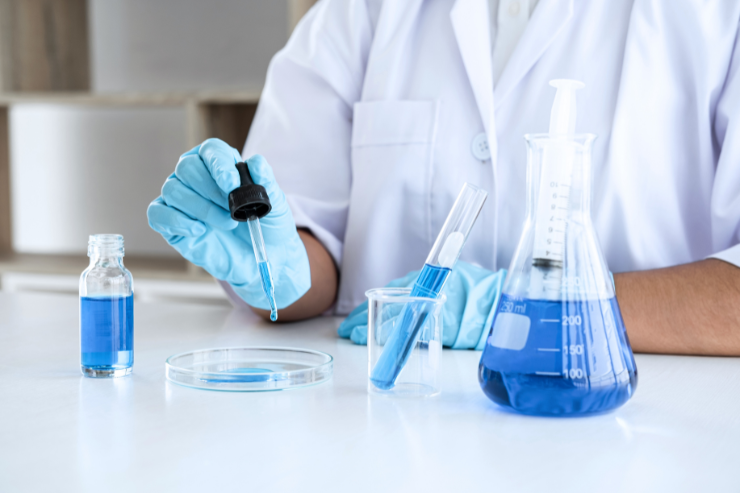
Biochemistry is a branch of clinical pathology that focuses on the chemical processes within and related to living organisms. It plays a vital role in diagnosing diseases, monitoring treatment effectiveness, and understanding the mechanisms of various physiological processes.
Biochemistry tests are crucial for:
Diagnosing Metabolic Disorders: Identifying abnormal levels of enzymes, hormones, or metabolites to diagnose conditions such as diabetes, thyroid disorders, and inborn errors of metabolism.
Monitoring Organ Function: Assessing the function of vital organs, such as the liver and kidneys, by measuring specific biomarkers in blood and urine.
Evaluating Nutritional Status: Determining levels of vitamins, minerals, and other nutrients to identify deficiencies or excesses that can impact health.
Blood Glucose Tests: Measure blood sugar levels to diagnose and monitor diabetes and other glucose metabolism disorders.
Liver Function Tests (LFTs): Evaluate the health of the liver by measuring enzymes, proteins, and bilirubin levels in the blood.
Kidney Function Tests (KFTs): Assess kidney health by measuring levels of waste products such as creatinine and urea in the blood.
Lipid Profile: Analyzes cholesterol and triglyceride levels to assess cardiovascular health and risk of heart disease.
Electrolyte Panel: Measures levels of electrolytes, such as sodium, potassium, and chloride, to monitor hydration and acid-base balance.
Hormone Tests: Determine levels of hormones such as thyroid hormones, cortisol, and sex hormones to diagnose endocrine disorders.
Enzyme Activity Tests: Measure the activity of specific enzymes to diagnose conditions like pancreatitis or muscle diseases.
Protein Electrophoresis: Separates and identifies different proteins in the blood to diagnose conditions like multiple myeloma or chronic inflammatory diseases.
Biochemistry testing is essential in clinical settings, research, and public health to understand disease mechanisms, develop new treatments, and monitor the health of populations. It helps healthcare providers make informed decisions about patient care and treatment strategies.
Biochemists, trained in analyzing biochemical test results, play a critical role in diagnosing diseases, monitoring treatment progress, and understanding metabolic pathways. They collaborate with healthcare teams to ensure accurate diagnosis, effective treatment, and comprehensive patient care.
Biochemistry is a branch of clinical pathology that focuses on the chemical processes within and related to living organisms. It plays a vital role in diagnosing diseases, monitoring treatment effectiveness, and understanding the mechanisms of various physiological processes.
Biochemistry tests are crucial for:
Diagnosing Metabolic Disorders: Identifying abnormal levels of enzymes, hormones, or metabolites to diagnose conditions such as diabetes, thyroid disorders, and inborn errors of metabolism.
Monitoring Organ Function: Assessing the function of vital organs, such as the liver and kidneys, by measuring specific biomarkers in blood and urine.
Evaluating Nutritional Status: Determining levels of vitamins, minerals, and other nutrients to identify deficiencies or excesses that can impact health.
Blood Glucose Tests: Measure blood sugar levels to diagnose and monitor diabetes and other glucose metabolism disorders.
Liver Function Tests (LFTs): Evaluate the health of the liver by measuring enzymes, proteins, and bilirubin levels in the blood.
Kidney Function Tests (KFTs): Assess kidney health by measuring levels of waste products such as creatinine and urea in the blood.
Lipid Profile: Analyzes cholesterol and triglyceride levels to assess cardiovascular health and risk of heart disease.
Electrolyte Panel: Measures levels of electrolytes, such as sodium, potassium, and chloride, to monitor hydration and acid-base balance.
Hormone Tests: Determine levels of hormones such as thyroid hormones, cortisol, and sex hormones to diagnose endocrine disorders.
Enzyme Activity Tests: Measure the activity of specific enzymes to diagnose conditions like pancreatitis or muscle diseases.
Protein Electrophoresis: Separates and identifies different proteins in the blood to diagnose conditions like multiple myeloma or chronic inflammatory diseases.
Biochemistry testing is essential in clinical settings, research, and public health to understand disease mechanisms, develop new treatments, and monitor the health of populations. It helps healthcare providers make informed decisions about patient care and treatment strategies.
Biochemists, trained in analyzing biochemical test results, play a critical role in diagnosing diseases, monitoring treatment progress, and understanding metabolic pathways. They collaborate with healthcare teams to ensure accurate diagnosis, effective treatment, and comprehensive patient care.
Ruler Diagnostics Pvt. Ltd, where we prioritize your health and well-being through comprehensive and precise diagnostic services. Our journey began with a shared vision among seasoned healthcare professionals to establish a diagnostic center that combines cutting-edge technology with compassionate care.